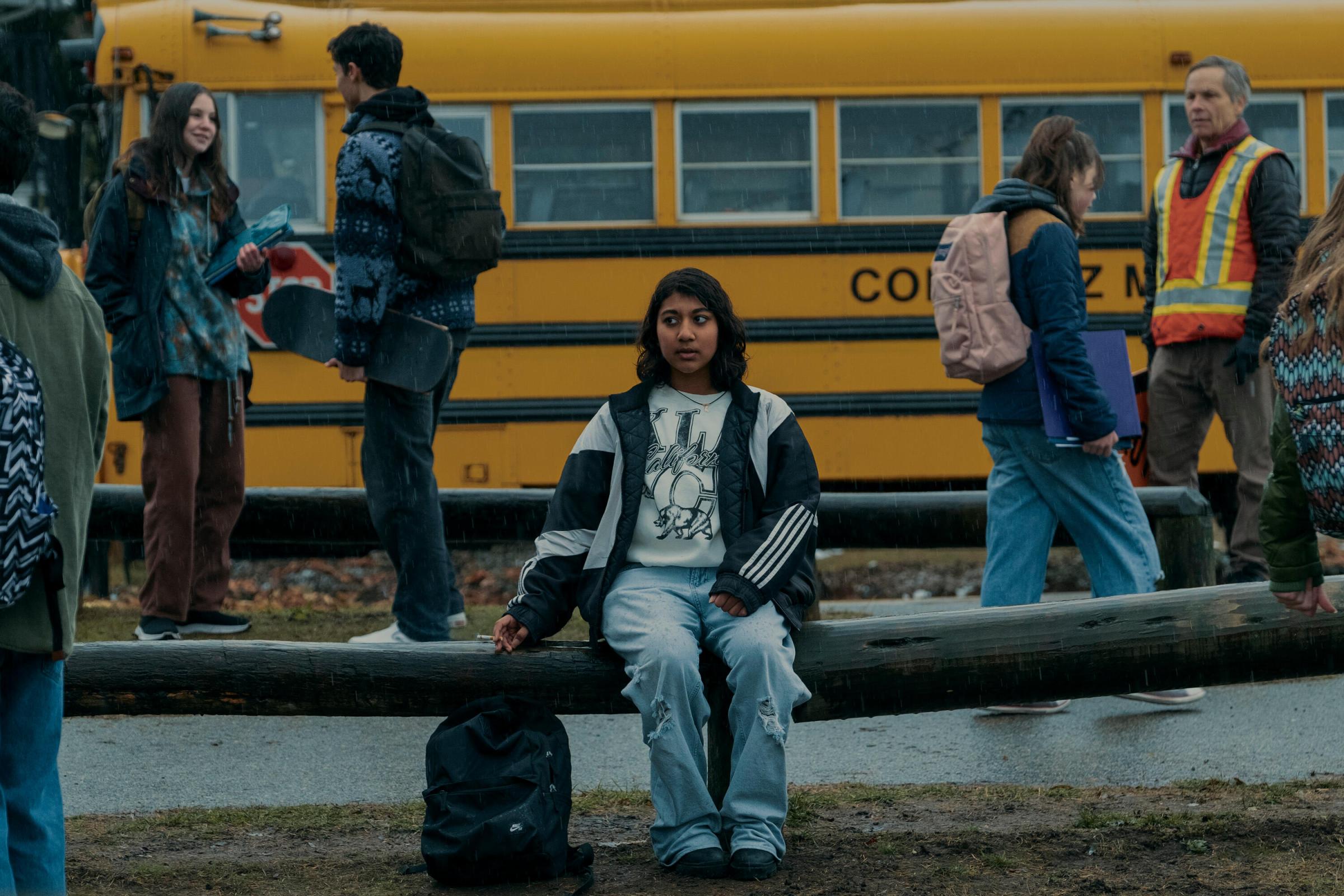Warning: This post contains spoilers for Under the Bridge.
On the evening of Nov. 14, 1997, 14-year-old Reena Virk was invited to a party near the Craigflower Bridge in Saanich, a suburb of Victoria, British Columbia. She never returned home, and was later discovered to have been ruthlessly beaten and killed by a group of her peers.
Based on late author Rebecca Godfrey's best-selling 2005 book of the same name, Hulu's new true-crime miniseries Under the Bridge dramatizes the before and after of Reena's brutal murder, which sent shockwaves throughout Canada. The first two episodes, now streaming, jump back and forth through time to depict the events that led up to Reena's (played by Vritika Gupta) death and the start of the investigation that followed.
Much of the show, created by Quinn Shephard, unfolds from the perspectives of Godfrey (played by Riley Keough), a journalist who grew up in Victoria and was working on a novel about teenage girls in her hometown at the time of the murder, and police officer Cam Bentland (Lily Gladstone), a composite character representing the local authorities who investigated and solved the case.
In real life, Godfrey did not aid in the investigation into Reena’s murder as she does in the series. But she did spend six years interviewing the accused and attending court trials after the fact. "I went home soon after [the killing] and went into the prison," Godfrey told Interview Magazine in 2019 of returning to her hometown. "I was just stunned because the girls all looked like normal, cool, young teenage girls, not particularly like killers."
Here's what to know about the true story behind Under the Bridge.
What happened to Reena Virk?

According to her father Manjit, who wrote a 2008 book about his daughter's life and death, Reena was bullied throughout her childhood. She grew up feeling like an outsider and frequently rebelled against her Indian-Canadian parents—who had raised her as a Jehovah's Witness in the tradition of her mother Suman's family. Prior to her death, Reena had run away on several occasions and reportedly falsely accused her father of physical, mental, and sexual abuse so that she could live in foster care, where she believed she would have more freedom. She later recanted her allegations of abuse and returned to live with her parents.
When she was 14, Reena started hanging out with a group of teens whose ringleader, Nicole Cook, has admitted to initiating the attack on Reena the night she was killed by putting a cigarette out on her forehead. Cook's counterpart in the Under the Bridge book and show is named Josephine Bell, a result of Godfrey fictionalizing the names of the eight teens involved in the assault with the exception of the two who were convicted of Reena's murder. Most of their real names have come out in subsequent years.
On the night of Reena's death, police arrived to break up a large gathering of teens hanging out in the field behind Saanich's Shoreline School. A smaller contingent then moved to the Craigflower Bridge, where Cook—who reportedly wanted to punish Reena for spreading rumors about her—and a group of seven others savagely beat Reena. After the rest had dispersed, two of the attackers, Cook's best friend, 15-year-old Kelly Ellard, and a 16-year-old boy named Warren Glowatski, followed Reena as she staggered away, continued to assault her, and ultimately drowned her in the nearby Gorge Waterway.
Reena's body was found a little over a week later on Nov. 22, 1997.
What happened to the teens responsible?
In 1998, the six girls—including Cook—who became known as the "Shoreline Six" were convicted of assault in juvenile court for their role in the initial attack that took place. They received sentences ranging from 60-day conditional sentences to one year in jail.
The following year, Glowatski was convicted of second-degree murder in adult criminal court and sentenced to life in prison with a chance at parole after seven years served. He openly expressed remorse and participated in restorative justice programs, including one in which he apologized face-to-face to Reena's parents. He was granted day parole in 2007 and full parole in 2010.
Ellard was also tried as an adult and convicted of second-degree murder in 2000. Her first conviction was overturned on appeal, leading to a second trial that ended in a mistrial in 2004 due to a hung jury. However, she was convicted again in a third trial in 2005 and received the same sentence as Glowatski. Ellard, who has changed her name to Kerry Sim, was granted day parole in 2017 after giving birth to her first child in prison and taking responsibility for her role in the murder for the first time. She subsequently gave birth to a second child while out on day parole in 2020 and reportedly rejected a chance for full parole in 2022, telling the Parole Board of Canada that she was "situationally" not ready for freedom.
In the months and years that followed Reena's murder, the case sparked an intense media frenzy and created a widespread moral panic over bullying and teen violence in Canadian society. Twenty years on, Godfrey wrote in a 2017 article for Vice that the crime "continues to fascinate and disturb."
More Must-Reads from TIME
- Donald Trump Is TIME's 2024 Person of the Year
- Why We Chose Trump as Person of the Year
- Is Intermittent Fasting Good or Bad for You?
- The 100 Must-Read Books of 2024
- The 20 Best Christmas TV Episodes
- Column: If Optimism Feels Ridiculous Now, Try Hope
- The Future of Climate Action Is Trade Policy
- Merle Bombardieri Is Helping People Make the Baby Decision
Write to Megan McCluskey at megan.mccluskey@time.com